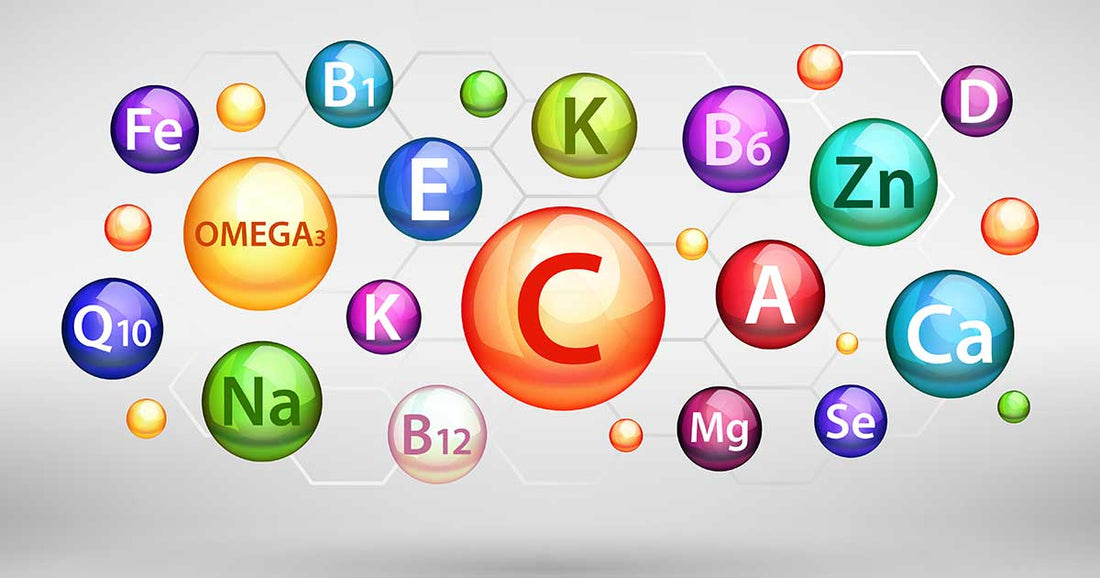The Top 12 Essential Minerals for Health

Share
In today's world, our soils are often overfarmed and depleted of many essential minerals, leaving our diets lacking in these crucial nutrients. Ensuring an adequate intake of important minerals is vital for maintaining overall health, as they play a significant role in various bodily functions. Here, we explore the top 12 essential minerals and their benefits.
Calcium
Calcium is a vital mineral that promotes strong bones and teeth. It also supports nerve function and muscle contraction, ensuring our bodies can perform daily activities efficiently. A calcium deficiency can lead to weakened bones and an increased risk of fractures and osteoporosis.[1]
Magnesium
Magnesium is essential for energy production, muscle function, and maintaining a healthy nervous system. It plays a key role in over 300 enzymatic reactions in the body, including those involved in energy creation and muscle relaxation. Adequate magnesium levels can help prevent muscle cramps and support overall physical performance.[2]
Potassium
Potassium supports nerve signaling, muscle contraction, and heart function. It is crucial for nutrient transport and cellular waste removal, helping to maintain proper cellular function. Adequate potassium intake can also help regulate blood pressure and reduce the risk of heart disease.[3]
Zinc
Zinc is crucial for immune system health, wound healing, and proper cellular metabolism. It plays a vital role in DNA synthesis and cell division, essential for growth and development. A zinc deficiency can lead to a weakened immune response and slower wound healing.[4]
Selenium
Selenium is a powerful antioxidant that supports immune function and thyroid health. It helps protect cells from oxidative damage and plays a role in DNA synthesis and repair. Adequate selenium levels are important for preventing chronic diseases and supporting overall health.[5]
Manganese
Manganese is crucial in antioxidant defense, bone health, and connective tissue formation. It forms bones and cartilage and helps protect cells from damage. Adequate manganese intake can support healthy bone development and reduce the risk of osteoporosis.[6]
Chromium
Chromium supports healthy blood sugar levels and assists in carbohydrate and lipid metabolism. It enhances the action of insulin, a hormone critical for regulating blood sugar levels. Adequate chromium intake can help prevent insulin resistance and support metabolic health.[7]
Copper
Copper is essential for iron absorption, collagen production, and connective tissue health. It also plays a role in the formation of red blood cells, the maintenance of nerve cells, and the immune system. Adequate copper levels are important for preventing anemia and supporting overall bodily functions.[8]
Molybdenum
Molybdenum is required to metabolize sulfur-containing amino acids and various enzymatic processes. It acts as a cofactor for enzymes detoxifying harmful substances and breaking down certain amino acids. Adequate molybdenum intake supports proper metabolic and detoxification functions.[9]
Iodine
Iodine is crucial for thyroid hormone production, metabolism regulation, and brain function. It helps control the body's metabolic rate and is vital for developing the nervous system. Adequate iodine intake can prevent thyroid disorders and support cognitive function.[10]
Vanadium
Vanadium is a trace mineral that may help support healthy blood sugar levels and insulin sensitivity. It plays a role in cellular signaling and the metabolism of glucose and lipids. Adequate vanadium intake can help improve insulin function and support metabolic health.[11]
Boron
Boron supports healthy bones and joints, promotes optimal hormonal balance, and aids nutrient absorption. It is involved in the metabolism of calcium, magnesium, and phosphorus, all critical for bone health. Adequate boron intake can help prevent bone disorders and support overall skeletal health.[12]
Conclusion
Adequate intake of these essential minerals is crucial for maintaining overall health and well-being. However, with our soils increasingly depleted of these nutrients, getting enough from diet alone can be challenging.
 That's where Min12absorb comes in. This supplement contains unique properties that enhance the absorption and bioavailability of necessary minerals, ensuring you receive the full spectrum of benefits. By incorporating Min12absorb into your daily routine, you can effectively support your body's mineral needs, promoting optimal health and vitality.
That's where Min12absorb comes in. This supplement contains unique properties that enhance the absorption and bioavailability of necessary minerals, ensuring you receive the full spectrum of benefits. By incorporating Min12absorb into your daily routine, you can effectively support your body's mineral needs, promoting optimal health and vitality.
References:
- Office of Dietary Supplements - Calcium. https://ods.od.nih.gov/factsheets/Calcium-HealthProfessional/. Accessed 17 July 2024.
- Office of Dietary Supplements - Magnesium. https://ods.od.nih.gov/factsheets/Magnesium-HealthProfessional/. Accessed 17 July 2024.
- Sur, Moushumi, and Shamim S. Mohiuddin. “Potassium.” StatPearls, StatPearls Publishing, 2024. PubMed.
- Maxfield, Luke, et al. “Zinc Deficiency.” StatPearls, StatPearls Publishing, 2024. PubMed.
- Office of Dietary Supplements - Selenium. https://ods.od.nih.gov/factsheets/Selenium-HealthProfessional/. Accessed 17 July 2024.
- Avila, Daiana Silva, et al. “Manganese in Health and Disease.” Metal Ions in Life Sciences, vol. 13, 2013, pp. 199–227. PubMed Central.
- Office of Dietary Supplements - Chromium. https://ods.od.nih.gov/factsheets/Chromium-HealthProfessional/. Accessed 17 July 2024.
- Office of Dietary Supplements - Copper. https://ods.od.nih.gov/factsheets/Copper-HealthProfessional/. Accessed 17 July 2024.
- Office of Dietary Supplements - Molybdenum. https://ods.od.nih.gov/factsheets/Molybdenum-HealthProfessional/. Accessed 17 July 2024.
- Zimmermann, Michael, and Paula R. Trumbo. “Iodine1.” Advances in Nutrition, vol. 4, no. 2, Mar. 2013, pp. 262–64. PubMed Central.
- Treviño, Samuel, et al. “Vanadium in Biological Action: Chemical, Pharmacological Aspects, and Metabolic Implications in Diabetes Mellitus.” Biological Trace Element Research, vol. 188, no. 1, 2019, pp. 68–98. PubMed Central.
- Pizzorno, Lara. “Nothing Boring About Boron.” Integrative Medicine: A Clinician’s Journal, vol. 14, no. 4, Aug. 2015, pp. 35–48. PubMed Central.
